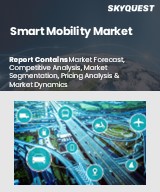
Report ID: SQMIG25A2467
Skyquest Technology's expert advisors have carried out comprehensive global market analysis on the smart mobility market, covering regional industry trends and market insights. Our team of analysts have conducted in-depth primary and secondary research to provide regional industry analysis and forecast of smart mobility market across North America, South America, Europe, Asia, the Middle East, and Africa.
As per the global smart mobility market outlook, the Asia Pacific region dominated the market during the forecast period, driven by rapid urbanization, economic expansion, and significant investments in smart city projects. Countries such as China, India, and Japan are leading the adoption of smart transportation solutions to manage increasing urban congestion and enhance mobility efficiency.
China is at the forefront of the smart mobility revolution, leading in EV production, high-speed rail networks, and AI-powered traffic management. The country’s aggressive push for electrification, coupled with massive investments in autonomous vehicle technology, has positioned China as a global leader in smart transportation. Government policies supporting carbon neutrality and infrastructure advancements are further driving innovation in mobility solutions.
India is rapidly advancing in smart mobility, with significant developments in electric public transport and intelligent traffic management systems. The Indian government’s Smart Cities Mission is driving the adoption of IoT-based traffic solutions, automated toll collection, and EV infrastructure expansion. With increasing investments in sustainable urban transport, India is emerging as a key market for smart mobility solutions tailored for high-density urban environments.
As per the global smart mobility market analysis, North America remains a key region in the market, supported by advanced technological infrastructure, regulatory backing, and high adoption rates of innovative transportation solutions. The United States and Canada are at the forefront of deploying autonomous vehicles, intelligent traffic systems, and shared mobility services, with government incentives accelerating the shift toward cleaner and more efficient transportation. The region’s strong focus on reducing emissions and enhancing urban mobility aligns with the global push for sustainable transport, ensuring continued market growth.
The United States leads the region with robust developments in autonomous vehicle testing, electric vehicle (EV) adoption, and AI-driven smart traffic systems. Major cities such as San Francisco and New York are deploying connected mobility solutions, including real-time public transport monitoring and smart parking systems, to improve traffic efficiency. Federal and state governments continue to incentivize EV adoption and infrastructure expansion, further driving market growth.
Canada is also emerging as a key player in the smart mobility sector, with a strong focus on sustainable transportation solutions. Cities like Toronto and Vancouver are implementing smart public transit systems that integrate data analytics and IoT for efficient operations. The Canadian government’s investment in EV charging infrastructure and green mobility initiatives is fostering a transition toward low-emission transport, positioning the country as a leader in sustainable urban mobility.
Europe is also a significant player, with countries such as Germany, France, and the UK actively investing in smart public transportation, electric vehicle integration, and shared mobility services. Europe's well-established infrastructure and government-driven initiatives further provide a favorable environment for smart mobility expansion, ensuring steady market growth in the coming years.
Germany leads the market with innovations in autonomous driving, EV infrastructure, and AI-based traffic management. The country’s automotive giants are investing heavily in smart vehicle technologies, and government-backed initiatives are accelerating the adoption of electrified public transport and intelligent mobility networks. Germany’s push for sustainable urban transport is setting new benchmarks for smart mobility solutions worldwide.
France is making strides in smart mobility by expanding its high-speed rail networks, electric bus fleets, and shared mobility services. Paris and other major cities are deploying AI-driven traffic control systems to reduce congestion and promote eco-friendly transportation. With strong governmental support for emission-free mobility and digital transport solutions, France is driving the adoption of smart mobility technologies to enhance urban connectivity and efficiency.
REQUEST FOR SAMPLE
Global Smart Mobility Market size was valued at USD 40 Billion in 2023 and is poised to grow from USD 45.68 Billion in 2024 to USD 130 Billion by 2032, growing at a CAGR of 14.2% in the forecast period (2025-2032).
The smart mobility industry is highly competitive, with major industry players, startups, and technology firms striving to develop innovative transportation solutions. Leading companies such as Siemens, Bosch, and IBM are leveraging AI, IoT, and cloud-based technologies to enhance mobility efficiency, improve traffic management, and optimize shared mobility services. Meanwhile, automotive giants like Tesla and Toyota are integrating smart mobility features, including autonomous driving capabilities and vehicle-to-infrastructure (V2I) communication, to stay ahead in the evolving landscape. 'Tesla Inc.', 'Uber Technologies Inc.', 'Lyft Inc.', 'Daimler AG', 'BMW Group', 'Ford Motor Company', 'General Motors Company', 'Toyota Motor Corporation', 'Volkswagen AG', 'Hyundai Motor Company', 'Waymo LLC', 'Didi Chuxing Technology Co.', 'Grab Holdings Inc.', 'Ola Cabs', 'Baidu Inc.', 'Intel Corporation', 'Cisco Systems Inc.'
The global smart mobility industry is significantly driven by the rapid urbanization and population growth observed across the globe. Cities are expanding at an unprecedented rate, leading to heightened demands for efficient transportation systems that can accommodate the growing number of residents. As more people move into urban areas, traditional transport infrastructures are being put under tremendous strain, resulting in increased traffic congestion, longer commute times, and a pressing need for more sustainable mobility solutions. This urban transition is forcing city planners and governments to rethink their transportation strategies, prioritizing smart solutions that integrate digital technology, data analytics, and innovative mobility options such as ride-sharing and electric vehicles.
How is Rapid Urbanization and Economic Growth Driving the Smart Mobility Market in Asia Pacific?
Want to customize this report? This report can be personalized according to your needs. Our analysts and industry experts will work directly with you to understand your requirements and provide you with customized data in a short amount of time. We offer $1000 worth of FREE customization at the time of purchase.
Feedback From Our Clients

Report ID: SQMIG25A2467
sales@skyquestt.com
USA +1 351-333-4748